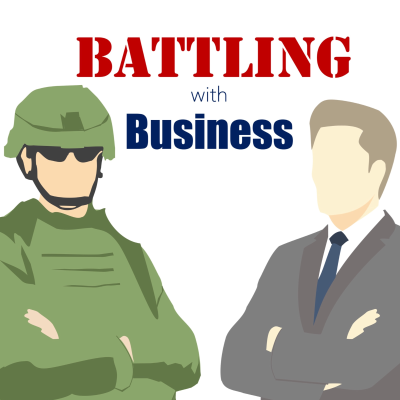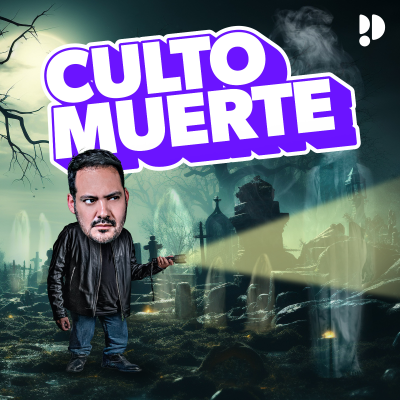
Battling with Business
English
Business
Limited Offer
2 months for 19 kr.
Then 99 kr. / monthCancel anytime.
- 20 hours of audiobooks / month
- Podcasts only on Podimo
- All free podcasts
About Battling with Business
In this podcast, Gareth Tennant, a former Royal Marines Officer, and Chris Kitchener, a veteran of the software development world, explore ideas and concepts around teams and teamwork, leaders and leadership, and all things in between. It’s a discussion between a former military commander and a business manager, comparing and contrasting their experiences as they attempt to work out what makes teams, leaders, and businesses tick.
All episodes
148 episodesEpisode 159 - Influencers #15 Re-Release - Niccolò Machiavelli - Power and Principle in an Age of Strongmen
This week we revisit, as a re-released episode, one of the most controversial figures in political and leadership thinking as part of our Influencers series. We ask a simple but uncomfortable question. Do good leaders sometimes have to do bad things? It seems particularly relevant given the world around us today. We return to Niccolo Machiavelli and explore whether he truly deserves his reputation as the patron saint of manipulation and ruthless ambition, or whether he was in fact one of the first serious thinkers to describe leadership as it actually is rather than as we might wish it to be. As we unpack The Prince and his wider thinking, we explore realism versus idealism, virtue versus effectiveness, and the enduring tension between being loved and being feared. We look at why Machiavelli separated personal morality from the morality of leadership, why he believed fortune favours the bold, and why he thought leaders must be prepared to act decisively in a world where not everyone plays by the same rules. This re-release feels strikingly relevant. From modern geopolitics to business leadership and even product management, the dilemmas he described five hundred years ago remain unchanged. How do you balance ethics with outcomes. When does pragmatism become compromise. And if the good people refuse to get their hands dirty, who fills the vacuum. If you care about leadership in the real world rather than leadership in theory, this episode will challenge your assumptions and sharpen your thinking. Whether you end up agreeing with Machiavelli or not, you will almost certainly see power, influence and responsibility differently by the end.
Episode 158 - Leadership and Management in an AI Powered World - Part 3
In this week’s episode we conclude our three part series on AI by tackling one of the most uncomfortable and important questions of all: surveillance, control and the future of decision making. If AI can see more than we can, interpret more than we can and act faster than we can, what does that mean for leaders, managers and the societies we operate in? Are we witnessing a natural evolution of tools that improve safety and efficiency, or are we quietly normalising a level of oversight that could reshape trust, accountability and power itself? We explore how surveillance is not new. From CCTV networks to financial forensics, from Rolls Royce monitoring engine performance to battlefield targeting systems, organisations have always gathered data to understand and act. What AI changes is the speed, scale and autonomy of those decisions. Dashboards become insights. Insights become actions. And actions increasingly happen without a human in the loop. We dig into the tension between efficiency and control. When machines outperform humans, should we step back? Or does leadership require us to retain oversight, even if it slows things down? We examine real examples from autonomous vehicles to military defence systems to workplace monitoring, asking where trust ends and overreach begins. A central theme emerges: explainability and accountability are not optional. If we cannot understand why a system made a decision, we have already surrendered more control than we realise. The challenge is not rogue robots. The challenge is how people use powerful systems, and whether we build in the guardrails that protect values, culture and civil liberties. This episode is not about easy answers. It is about asking better questions. As leaders, managers and participants in organisations, we cannot afford to treat AI as someone else’s problem. The pace of change is accelerating. The trade offs are real. The responsibility is ours. If you care about leadership, decision making and the future of power in organisations, this is an episode you will want to hear.
Episode 157 - Leadership and Management in an AI Powered World - Part 2
In this week’s episode we continue our exploration of what it really means to lead and manage in a world increasingly shaped by AI. Rather than asking whether AI is good or bad, we focus on a harder and more important question: how leadership, culture, trust and experience change when intelligent systems begin to make decisions alongside us, or instead of us. We reflect on how quickly AI is moving from a visible tool to an embedded part of everyday systems, much like navigation or automation in heavy industry, and what that means for managers who may find themselves acting less as decision makers and more as the accountable interface between machines and organisations. We dig into the uncomfortable reality that junior roles, often the foundation of experience and judgement, may be the first to disappear, and ask how organisations can still develop depth, mastery and resilience without simply hollowing out the future talent pipeline. The conversation then turns to values, culture and trust. If AI systems increasingly communicate with customers, recommend actions, or even shape strategy, how do leaders ensure those systems reflect the culture they claim to stand for. We explore why culture is not something you can just encode once and forget, why predictability matters, and why leading by algorithm demands very different skills from leading by example. We also challenge the idea that humans will always retain a unique edge, questioning assumptions about creativity and empathy, while still arguing that leadership choices, trade offs and restraint matter more than ever. This episode is not about answers. It is about asking better questions, understanding the risks of being confidently wrong, and recognising that how leaders respond now will shape whether AI strengthens organisations or quietly undermines them. If you lead people, build teams, or care about the future of work, this is a conversation you cannot afford to ignore.
Episode 156 - Leadership and Management in an AI Powered World - Part 1
In this week's episode we start a new mini series by asking a question that sits underneath all the noise about artificial intelligence and jobs. What does leadership and management actually mean when AI becomes a permanent participant in how organisations think, decide, and act? Rather than debating whether AI is good or bad, we focus on the practical reality that it is already here and already shaping behaviour, decisions, and power. We explore how leaders can lead when parts of the organisation are no longer human, how experience and judgment are built if entry level roles disappear, and what happens to values, culture, and trust when decision making becomes increasingly opaque. Drawing on examples from business, education, policing, medicine, and the military, we talk through why this is not just a philosophical discussion but a very real leadership challenge. The leaders who succeed will be the ones who understand how to work with AI as a judgment system rather than treating it as a simple tool or a replacement for thinking. This episode sets the context for the rest of the series and makes the case that leadership in an AI enabled world will demand more clarity, accountability, and intent than ever before. If you care about building teams, developing future leaders, and retaining trust in complex organisations, this is a conversation worth spending time with.
Episode 155 - Influencers #27 - Elizabeth Holmes - How Selling the Dream Became Selling Bullshit
In this week’s episode we look at one of the most uncomfortable leadership stories of the modern business era. Elizabeth Holmes and Theranos force us to confront how easily confidence, narrative, and status can be mistaken for competence and truth. We explore how a young, driven, and highly credible founder built a nine billion dollar company, attracted world class investors, and became a symbol of innovation, while quietly crossing the line from ambition into deception. We talk about the cult of leadership, the danger of survivor bias, and why we are so keen to believe in heroic founders. We examine the grey area between selling a vision and selling something that simply does not exist, and how leaders can gradually drift from optimism into outright dishonesty without a single dramatic moment of failure. The episode explores integrity, authority bias, and the responsibility of both leaders and followers. We discuss why intelligent, experienced people can still be fooled, what this story teaches us about accountability, and how leaders should balance hope, confidence, and truth when the stakes are high. This is not just a story about one flawed individual. It is a lesson for anyone who leads, invests, follows, or wants to believe in simple stories of success. If you care about leadership, ethics, and decision making under pressure, this episode will challenge some comfortable assumptions.
Choose your subscription
Limited Offer
Premium
20 hours of audiobooks
Podcasts only on Podimo
All free podcasts
Cancel anytime
2 months for 19 kr.
Then 99 kr. / month
Premium Plus
Unlimited audiobooks
Podcasts only on Podimo
All free podcasts
Cancel anytime
Start 7 days free trial
Then 129 kr. / month
2 months for 19 kr. Then 99 kr. / month. Cancel anytime.





































